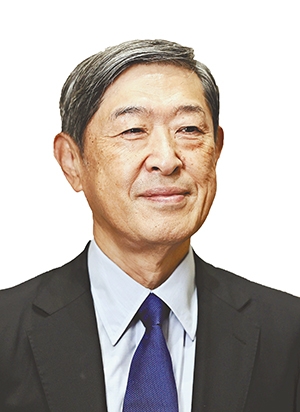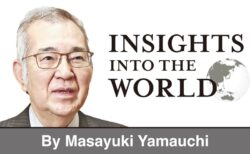11:30 JST, May 3, 2024
Thirty years have passed since major political reforms took place in Japan in 1994, culminating in the revision of the electoral system and the Political Funds Control Law.
Some say the political reforms in 1994 were whittled down to electoral change. But the election reform itself was still significant, given that it changed the rules for electing members of the Diet.
In the closing years of the Meiji era (1868-1912), House of Representatives elections were held in large multi-seat constituencies, which allowed each prefecture, excluding key cities, to elect several lower house members as its representatives in the chamber. The government at the time, led by elder statesmen and senior bureaucrats, took advantage of the electoral system to ensure a multi-party split within the lower house and control it from the outside.
In 1919, Prime Minister Takashi Hara introduced single-seat constituencies, hoping to allow a majority party to become so dominant a parliamentary force that it could keep the elder statesmen and senior bureaucrats at bay.
The rules for a competition greatly affect the outcome of that competition. This is true for the 1994 reforms as well, which brought about a truly significant change in the Japanese political landscape.
Until that year, politics ran on the so-called 1955 system. The Liberal Democratic Party was the dominant parliamentary force and the opposition, led by the Japan Socialist Party, was not a significant threat, so the only real political changes were within the LDP. The 1955 system was sustained by one external factor, the Cold War, and one internal factor, multi-seat districts.
During the Cold War, a period that was marked by the confrontation between the United States and the Soviet Union, Japan had to align itself with the so-called West and arm itself to a certain extent to ensure the country’s security and prosperity. Under such circumstances, there was virtually no chance for the JSP to come to power, since it advocated unarmed neutrality and viewed the Self-Defense Forces as unconstitutional.
Prior to the 1994 political reforms, Japan had about 130 constituencies in the lower house. Most of them elected three to five members, with the LDP regularly fielding multiple candidates in each district.
At the time, the LDP had several factions within it. Faction leaders sought to enlarge their groups so they could eventually be elected party president, and thereby become prime minister. In each constituency, they supported candidates endorsed by their own faction, leading to fierce competition among LDP candidates backed by rival factions. In their races, the candidates competed to offer numerous “services” to voters, rather than touting policies or ideology, which meant they needed masses of political funds to become successful candidates. The situation became so problematic that it finally triggered the 1994 political reforms.
Political funds are now back in the spotlight as a major problem. Nonetheless, a new candidate running with a major party in a general election today is estimated to need less than 10% of the funding they would have needed before 1994. While it is true that there are still many shortcomings in political funds controls, the conditions surrounding new candidates have improved tremendously.
Policy-oriented factions
For decades prior to 1994, the LDP had about five powerful factions, meaning the leader of any one faction had to form an alliance with at least two others. The term of the LDP presidency was two to three years. So if the leader of Faction A became president of the party thanks to an alliance with factions B and C and wanted to stay in that post for two terms, then the leader of Faction B would have to wait at least four years and the leader of Faction C at least six years for a turn at the top.
As the leaders of factions B and C could not afford to wait that long, they would block the leader of Faction A from being reelected LDP president. As a result, Kakuei Tanaka, Takeo Fukuda and Masayoshi Ohira, all of whom were known as powerful leaders, each served only one term as prime minister.
One exception was Eisaku Sato, who served four terms for eight years as prime minister. Unlike other faction leaders in the LDP, Sato — a brother of then former Prime Minister Nobusuke Kishi — needed to secure the backing of only one more faction to become LDP president, as he already had a close relationship with Kishi’s faction — which was virtually inherited by Fukuda’s faction. Yasuhiro Nakasone, backed by the then largest faction led by Tanaka, served as prime minister for five years. At the time, the Tanaka faction had little choice but to support him, as its boss was unable to replace Nakasone due to his obligation to appear in court for his involvement in the Lockheed bribery scandal, which came to light in 1976.
Incidentally, during the years when multi-seat constituencies were in place, political leaders competed with one another over policies and their visions for Japan so they might outdo their rivals in the fierce party leadership race. This political environment led then Prime Minister Hayato Ikeda, for example, to float his ambitious goal of doubling people’s income. Similarly, Eisaku Sato made good on his pledge to get Okinawa back from the United States.
Moreover, the key politicians active before 1994 had endured hardship, experiencing Japan’s defeat in World War II and the difficult postwar years. Their determination to reconstruct Japan led them to pursue a career in politics.
Comparing the political landscape in Japan before and after 1994, the characteristics of today’s politics become clearer.
First, today’s political factions differ greatly from those of the past. The LDP president now has so much power that no faction will oppose him even if they opt to be so-called non-mainstream factions. This allows an LDP leader to stay party president for a long time even if they are not as powerful as Tanaka, Fukuda, Ohira or Nakasone.
No visible policy goals
What worries me is that none of the politicians rumored to be likely candidates for prime minister have come up with their own political vision for how they will lead Japan as the head of the government. And the media, for its part, stops short of looking into likely candidates’ policies and views, while indulging in predictions based on the personal connections between politicians.
It is often said that in a democracy politicians should represent the will of the people. However, the people do not necessarily have definite opinions about many of the country’s important policies. Democratic politics works when politicians present policies and the people react to them. In other words, the public’s will emerges out of competition among politicians. But now the public is not being presented with policy options.
So far, I have mostly discussed the LDP. Of course, in many countries when the incumbent government reaches an impasse, an opposition party or parties step forward and take over. It is deeply concerning that Japan’s opposition parties today do not present any definite political vision.
As in the past, many in the opposition camp cling to unrealistic foreign and security policies. Do they believe they would be able to steer through today’s difficult international circumstances without the 2015 Legislation for Peace and Security and the Cabinet-approved three key defense and security-related documents? The documents include a plan to increase Japan’s defense spending from 1% of its gross domestic product to 2% by fiscal 2027. These policy changes are strongly supported by the United States, all other advanced democracies, all Southeast Asian countries and many major emerging countries, including India. I recommend the opposition accept this reality. Otherwise, the LDP will undoubtedly stay in power.
The years since 1994 have also seen no progress on Diet reform, and no genuine debate takes place there. An opposition party will generally ask something like: “Is this policy perfect?” The government will reply: “Yes, it is.” The government always tries to ensure in its response that it gives the opposition no material for future attacks. It is politicians’ job to make better policy choices, and there can be no perfect policy.
The Diet must be transformed into a forum for real debate. At present, the ruling camp is not allowed to criticize or refute opposition parties in parliamentary deliberation. This rule should be revised and the ruling camp encouraged to criticize the opposition. Mutual criticism will make better choices possible. If the LDP thinks the opposition’s security policies are unrealistic and irresponsible, it should press them on the issue. Once an opposition party finds it cannot to stand up to criticism from the government, it may change its policy and take a more realistic stance.
Japan is currently faced with the huge task of making political funds transparent. This is an extremely important task. To pull it off, an environment will have to be created in which political parties compete fairly in proposing solutions and the people are asked to determine which party is right.

Shinichi Kitaoka
Shinichi Kitaoka is a professor emeritus at the University of Tokyo specializing in Japanese political and diplomatic history. His previous posts have included Japanese ambassador to the United Nations in 2004-06 and president of the Japan International Cooperation Agency in 2015-22.
The original article in Japanese appeared in the April 28 issue of The Yomiuri Shimbun.
Top Articles in Editorial & Columns
-

Riku-Ryu Pair Wins Gold Medal: Their Strong Bond Leads to Major Comeback Victory
-

40 Million Foreign Visitors to Japan: Urgent Measures Should Be Implemented to Tackle Overtourism
-

China Provoked Takaichi into Risky Move of Dissolving House of Representatives, But It’s a Gamble She Just Might Win
-

University of Tokyo Professor Arrested: Serious Lack of Ethical Sense, Failure of Institutional Governance
-

Policy Measures on Foreign Nationals: How Should Stricter Regulations and Coexistence Be Balanced?
JN ACCESS RANKING
-

Japan PM Takaichi’s Cabinet Resigns en Masse
-

Japan Institute to Use Domestic Commercial Optical Lattice Clock to Set Japan Standard Time
-

Israeli Ambassador to Japan Speaks about Japan’s Role in the Reconstruction of Gaza
-

Man Infected with Measles Reportedly Dined at Restaurant in Tokyo Station
-

Videos Plagiarized, Reposted with False Subtitles Claiming ‘Ryukyu Belongs to China’; Anti-China False Information Also Posted in Japan























